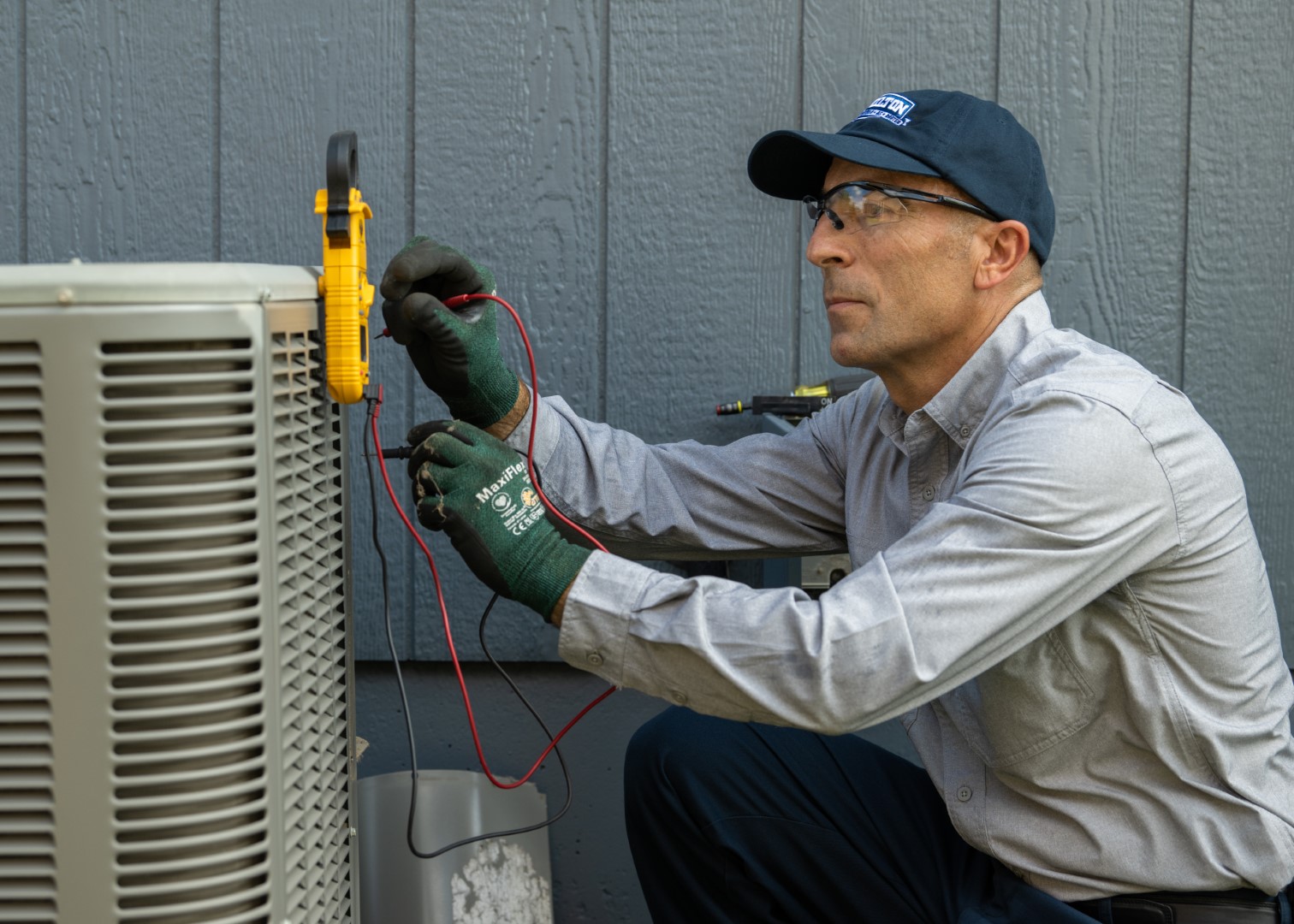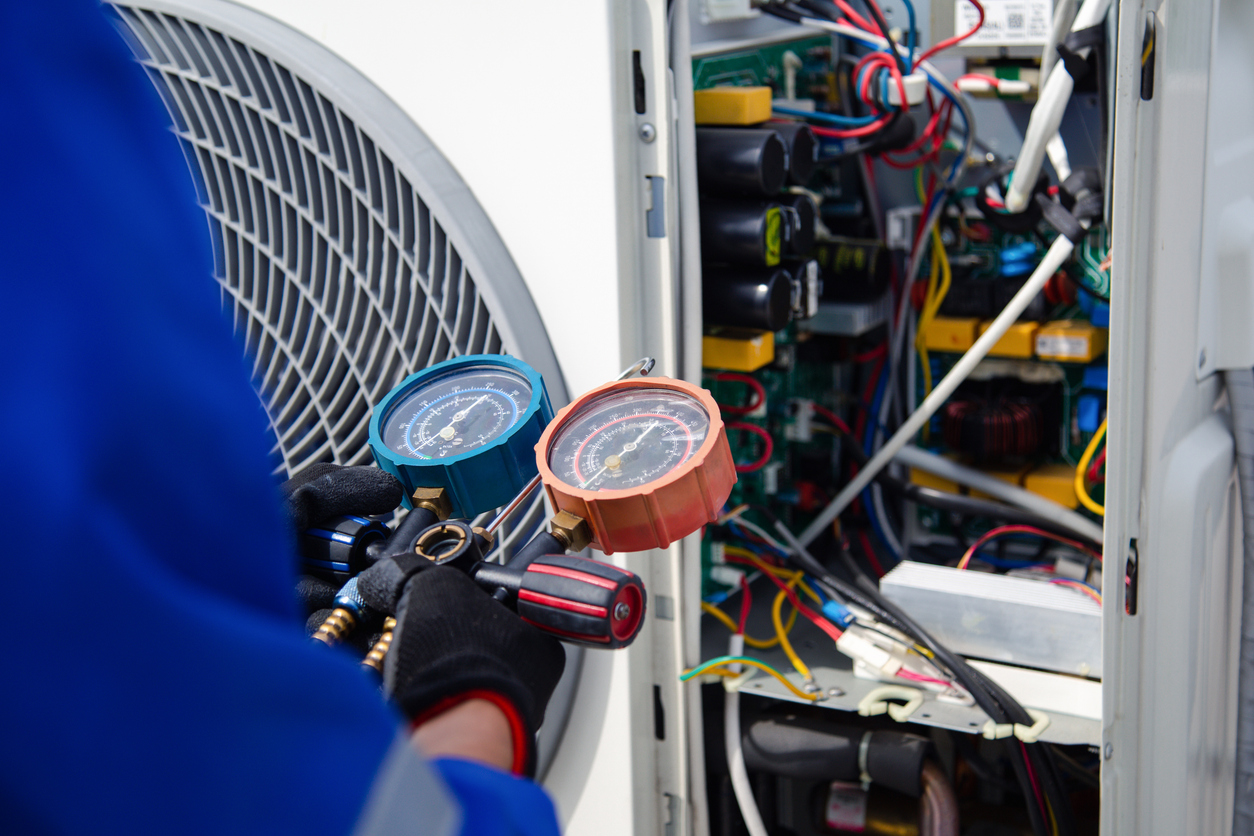AC unit replacement: timeline explained
Wiki Article
All Regarding HVAC: Identifying Common Issues and Effective Air Conditioning Repair Methods
HVAC systems are essential for maintaining interior convenience. Comprehending their elements and functionality is essential for identifying common concerns. Homeowners often face issues such as inadequate air conditioning, unusual smells, or increasing energy expenses. These indications can suggest underlying issues that may require focus. Discovering do it yourself troubleshooting techniques can be helpful, however recognizing when to seek professional help is similarly important. What actions can be required to assure durable performance?Comprehending Your HVAC System: Components and Capability
A HVAC system, usually considered the backbone of interior environment control, consists of a number of crucial parts that interact to regulate temperature level and air top quality. The key aspects include the home heating device, air flow system, and air conditioning system. The heating system, typically a heating system or boiler, generates warmth during colder months, while the air conditioning unit cools interior rooms during the summertime.
Common HVAC Troubles House Owners Encounter
Home owners often encounter several common heating and cooling troubles, including irregular temperature level circulation throughout their space. Additionally, uncommon sounds during procedure can suggest underlying problems that call for attention. Resolving these worries promptly is necessary for preserving ideal system efficiency.Inconsistent Temperature Level Circulation
Lots of families experience the frustrating issue of irregular temperature circulation, where particular rooms feel annoyingly warm while others continue to be also cold. This issue usually arises from a variety of elements, including bad insulation, obstructed vents, or an improperly sized a/c system. When ducts are not adequately secured or when furniture blocks airflow, some areas might obtain insufficient air conditioning. Furthermore, thermostat positioning can significantly affect temperature policy; a thermostat located in a sunlit area may misstate the overall temperature of your house. Routine maintenance, including cleansing filters and making sure ductwork is clear, can aid reduce these disparities. Homeowners might additionally think about zoning systems to better control temperature levels throughout different areas of the home, promoting a more comfortable living environment.Unusual Noises During Operation
When an a/c system runs, unusual noises can suggest underlying problems that call for focus. Homeowners might come across a variety of noises, such as grinding, squeaking, or hissing. Grinding sounds often signal damaged bearings or parts, while squeaking can suggest loose belts or components requiring lubrication. Hissing may show a cooling agent leak, which can endanger the system's effectiveness. Additionally, banging sounds might aim to loosened ductwork or an issue with the blower fan. Each of these sounds functions as a warning, triggering house owners to examine additionally. Overlooking these indicators can lead to more substantial troubles and costly repair work. Normal maintenance and punctual focus to uncommon noises can boost system durability and performance, guaranteeing a comfortable living setting.Indicators That Indicate Your Air Conditioning Requirements Repair
Just how can one tell if their air conditioning system requires fixing? Numerous indications may suggest underlying concerns requiring specialist attention. First, if the air conditioner fails to cool down the space successfully, it may suggest a cooling agent leakage or compressor breakdown. In addition, an increase in energy expenses without matching usage modifications can indicate inadequacy in the system. Homeowners must additionally look out to unusual smells emanating from the system, which could indicate mold and mildew growth or electric concerns. If the Air conditioning frequently cycles on and off, it might be an indication of a malfunctioning thermostat or various other mechanical problems. Ultimately, the visibility of water merging around the device can indicate a stopped up drainpipe line. Acknowledging these indicators early can save money and time, ensuring that the cooling system runs efficiently and effectively.DIY Troubleshooting Techniques for A/c Issues
When facing a/c problems, home owners can utilize numerous DIY repairing strategies to identify the problem. Trick approaches include examining thermostat settings, inspecting air filters, and assessing water drainage problems. These actions can assist identify usual breakdowns prior to seeking professional help.Inspecting Thermostat Setups
What actions should homeowners take to assure their thermostat settings are proper? Initially, they ought to validate the thermostat is set to the wanted temperature and mode, whether heating or cooling. Looking for a clear screen and validating the thermostat is not established to "hold" or "vacation" mode is necessary. House owners need to also verify that the thermostat is level and mounted in a place without drafts, direct sunlight, or various other temperature level affects. In addition, recalibrating the thermostat can aid offer precise analyses. If the thermostat operates on batteries, replacing them may resolve any type of concerns. By methodically examining these factors, property owners can frequently recognize and correct thermostat-related issues, promoting perfect HVAC system performance.Inspecting Air Filters
Air filters play a crucial function in maintaining perfect HVAC performance. They catch dust, irritants, and other particles, making certain tidy air blood circulation. Over time, filters can come to be clogged, reducing airflow and efficiency. To inspect air filters, people need to first find the filter, usually located in the return air duct or near the heating system. As soon as situated, they should evaluate the filter's problem-- if it appears dirty or stained, it most likely browse around this site requirements substitute. A lot of filters call for transforming every 1-3 months, depending on use and environmental factors. Routine evaluation and timely substitute of air filters not only boost air top quality yet also lengthen the life-span of HVAC systems, preventing possible breakdowns and costly repair work.
Assessing Water Drainage Issues
How can property owners successfully identify and attend to water drainage problems within their HVAC systems? Initially, they need to inspect the condensate drain line for clogs or obstructions, which can cause water buildup. House owners may use a wet/dry vacuum cleaner to remove any debris blocking the line. Next, examining the drainpipe frying pan for corrosion or leakages is vital, as a damaged pan can trigger water to overflow. Routine cleansing of the drainpipe line with a mixture of vinegar and water helps avoid future obstructions. In addition, ensuring appropriate incline of the drain line promotes reliable water circulation. If these DIY strategies do not fix the problem, getting in touch with an expert a/c specialist might be essential to stay clear of prospective water damage and system failing.When to Call an Expert for Air Conditioning Repairs

While some a/c problems can be more tips here dealt with through DIY approaches, there are situations where calling a professional ends up being important. House owners should look for expert help when they come across consistent troubles, such as poor cooling, odd noises, or uncommon odors rising from the unit. These signs and symptoms may suggest deeper problems that require specialized understanding and devices to diagnose and repair correctly.

Preventative Maintenance Tips for Cooling And Heating Long Life
Normal preventative maintenance can significantly improve the longevity of a/c systems. Property owners should set up annual assessments by certified professionals to examine system efficiency and recognize potential problems. Frequently transforming or cleaning air filters is vital, as this guarantees appropriate air flow and lowers strain on the system. In enhancement, inspecting and securing ductwork prevents power loss and boosts total performance.
It is also suggested to maintain the outside device clear of debris and greenery, permitting peak air movement and warm exchange. Homeowners need to check the condensate drain for clogs to stay clear of water damages and mold and mildew growth. Furthermore, preserving proper thermostat setups and making use of programmable options can enhance energy performance. Lastly, documenting maintenance activities aids track service background and can aid in determining recurring issues (ac unit replacement). By complying with these preventative actions, people can make the most of the performance and lifespan of their heating and cooling systems
Often Asked Questions
How Frequently Should I Replace My Cooling And Heating System Filters?
Heating and cooling system filters need to commonly be changed every one to 3 months, depending on use, filter type, and ecological aspects. Regular replacement helps maintain effectiveness and air top quality, making sure peak system performance throughout the year.What Size Heating And Cooling System Do I Need for My Home?
To my website establish the proper cooling and heating system size for a home, one must think about square video footage, insulation high quality, and neighborhood environment. Consulting a professional can assist assure maximum performance and convenience for the particular living room.Are There Eco-Friendly A/c Options Available?
Yes, environment-friendly heating and cooling options are available, consisting of energy-efficient warm pumps, solar-powered systems, and geothermal heating. These alternatives minimize energy intake and ecological effect, advertising sustainability while maintaining effective climate control for domestic and commercial spaces.Exactly How Can I Enhance My HVAC System's Power Performance?
To improve HVAC energy performance, one can frequently maintain the system, seal air leakages, set up programmable thermostats, make use of energy-efficient filters, and guarantee ample insulation throughout the home to lower power usage and enhance efficiency.
What Is the Average Life-span of a Heating And Cooling System?
The ordinary life expectancy of an a/c system normally ranges from 15 to 25 years, depending upon elements such as upkeep, usage, and the high quality of installment. Regular upkeep can substantially extend its functional durability.Conclusion
In recap, a thorough understanding of a/c systems encourages homeowners to determine usual concerns and address small issues successfully. Acknowledging signs of malfunction, utilizing DIY fixing strategies, and focusing on routine upkeep can improve system performance and efficiency. When faced with complex fixings, employing expert aid is critical to ensure safety and durability. By fostering recognition and proactive treatment, individuals can delight in a comfortable indoor atmosphere while lessening unexpected expenses associated with a/c failings.Report this wiki page